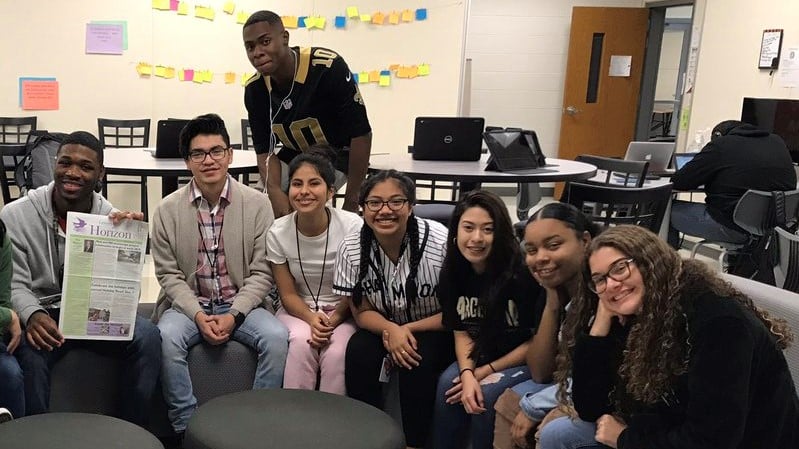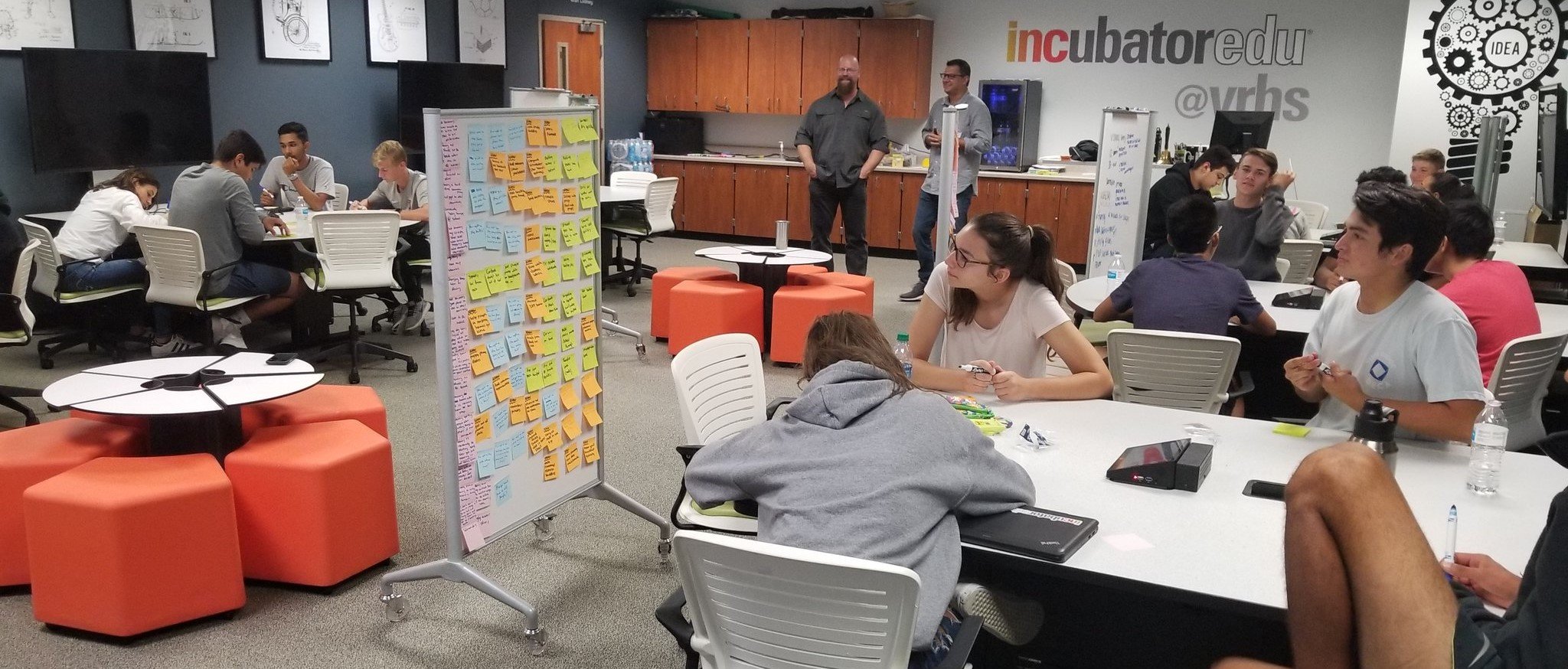 A panel of economic and education leaders gathered to discuss Learning with a Purpose: Preparing Texas Students for the Future of Work Through Entrepreneurship. That conversation spotlighted the role of 'purpose' in learning, preparing students for life, and the importance of aligning community expectations, and leveraging that connection. Student entrepreneurship was the context for this roundtable, however, many highlights of the panel’s conversation apply to the broad arenas of life and learning.
A panel of economic and education leaders gathered to discuss Learning with a Purpose: Preparing Texas Students for the Future of Work Through Entrepreneurship. That conversation spotlighted the role of 'purpose' in learning, preparing students for life, and the importance of aligning community expectations, and leveraging that connection. Student entrepreneurship was the context for this roundtable, however, many highlights of the panel’s conversation apply to the broad arenas of life and learning.
'Human skills' are key for student future-readiness
Technology skills are often top of mind when thinking about skills that are in high demand in the future of work, but employer expectations are also surprisingly in the arena of 'human skills'. According to the World Economic Forum, the top five skills for 2025 that employers want are:
-
Analytical thinking & innovation
-
Active learning & learning strategies
-
Complex problem solving
-
Critical thinking & analysis
-
Creativity, originality & initiative
“Employers are expecting a certain level of digital literacy among employees. But they also know that change is constant and they need employees who can adapt, and actually bring the part that the computers can't do -- the thinking, the processing. They're human skills.”
~Evo Popoff, SVP Whiteboard Advisors
Entrepreneurs can grow Texas out of this economic downturn
The expansion and migration of well-known businesses to Texas make headlines (Tesla, Facebook, Apple are a few) yet other dynamics challenge the state’s economy.
“Houston and other areas of the state have been hit hard by the oil and gas downturn and the pandemic. When you think about how Texas recovers, it's not going to be just about business attraction. We’re going to grow out of COVID [economy] with entrepreneurs. In Texas, we don’t have enough of those.”
~ Carlton Schwab, President/CEO Texas Economic Development Council
Whether students create their own businesses or work for an existing company, skills inherent to entrepreneurship will be needed to recognize problems, create solutions, and develop business models that create and/or elevate growth potential.
Purposeful, experiential learning can drive deep learning
Texas education leaders are emphasizing engagement of students in purposeful, authentic learning.
“We're going to focus on serving children, we're going to design engaging experiences that lead to profound learning, and a love of learning for life. It's moving from passive to active learning, it's moving from something that feels irrelevant to something that really gets kids engaged in something that gets them excited about learning.”
--Dr. Kevin Brown, TASA Executive Director
 Dr. Brown cited hands-on experiences as ways to create deeper learning. For example, maker and entrepreneurship programs offer students ways to apply core subjects like math and literacy on students’ creations. More specifically, these experiences allow students to “do, fail, and learn forward.” While the experiential learning concept is not new, it often gets muffled in the noise of ever growing assessment and testing demands.
Dr. Brown cited hands-on experiences as ways to create deeper learning. For example, maker and entrepreneurship programs offer students ways to apply core subjects like math and literacy on students’ creations. More specifically, these experiences allow students to “do, fail, and learn forward.” While the experiential learning concept is not new, it often gets muffled in the noise of ever growing assessment and testing demands.
A how-to: Allow the real world into the classroom for context and relevance
When professionals in their respective fields are invited to share their expertise, then “real” enters the classroom, and the lessons come alive and are credible for students.
“The benefit that you get from having that real world experience in whatever program it is, whether it's entrepreneurship, whether it's your health science program...working with industry to provide that experience is more than worth the payoff.”~ Camille Clay, Leander ISD, Senior Director of College & Career Transition Programs
School districts may create learning opportunities that bring real-world experiences into the classroom, but they don’t have to do everything on their own. Programs such as INCubatoredu entrepreneurship offer frameworks where business professionals co-teach a lesson in their particular area of expertise or serve as a mentor to student teams who are creating and testing a business model.
Understanding your community’s needs from education creates a powerful dynamic
National standards expect academic achievements at key grade levels, yet a community’s needs from local education also deserve consideration.
“We're surrounded by innovative entrepreneurial businesses everywhere in Austin and the surrounding area. So we take that extremely seriously, we're preparing our students to meet that community need. Our graduate profile references things like critical and creative thinkers, skilled communicators and collaborators, compassionate community contributors, and adaptable and reflective individuals.”
~Dr. Bruce Gearing, Superintendent Leander ISD
Leander ISD’s graduate profile descriptors are in keeping with the Leander-Austin area needs, and they are also consistent with those qualities at the top of the World Economic Forum list for what employers want. This district addresses both community needs and global needs, allowing Leander ISD graduates to realize opportunities close to home as well as around the world.
Ignite interests & passions for student-driven learning
“Kids don't really learn at deep levels until they're connected to their interests and passions. And so we have lots of kids who go through the process of school and are compliant and do well enough, but they never really launched right. So they never really get it ignited.”
~Dr. Bruce Gearing, Superintendent at Leander ISD
Having a purpose to the learning helps ignite students’ passions and deepens their learning, setting students on a path for lifelong learning -- all dynamics that enable them to navigate the uncertainties of the future. That’s the point isn’t it?
Students are not the only ones ignited on the journey...
 “Happy teachers make happy kids, and when they're truly engaged and passionate about something that ignites their kids, then the learning happens at completely different levels.“
“Happy teachers make happy kids, and when they're truly engaged and passionate about something that ignites their kids, then the learning happens at completely different levels.“
--Dr. Bruce Gearing, Leander ISD Superintendent
Audacious belief? Actually, it’s what's happening in dozens of Texas school districts including Alamo Heights, Eanes, Frisco, Galveston, Irving, Lewisville, and Midlothian.
When learning is relevant and meaningful to students, they learn deeply and with conviction, and they are better prepared for what's next. Learn more about the benefits of entrepreneurship education for students.
For more from this panel, you'll find the on-demand replay of the webinar here.

RELATED:
BLOG POST, Guest: Evo Popoff, The Case for Youth Entrepreneurship
BLOG POST: Teen Businesses - Finding Purpose in Doing 'Good'
BLOG POST: Deeper Learning by Instilling 'Purpose' - Youth Entrepreneurship

